人教版英语中考总复习第三册下
2021年春人教版英语中考专题复习——七年级下Units 1—3(含答案)

七年级下Units 1—3一、选择型阅读A(2019·河南B卷)It was just another busy day until I met that boy on a bus.No.He was not a passenger like me.He was,what we call,a street child—an 8 to 10 years old kid with a worn Tshirt.These poorlydressed kids were seen almost everywhere in Dhaka city,but what was special about that boy was his face.There was “something”in him that caught my attention—an angelic baby face with little care.He got straight into the bus as it stopped at a traffic light.The bus helper shouted at him in the first place but the boy remained silent and started handing out a piece of paper to all the passengers.What was written in the paper was that,in short,his father died a couple of years ago.His mother worked at houses.He needed money to help his family,so we could buy chocolates from him.Now this was nothing new to people who used a bus every day and I was no different.I had my earphones on.When he came to me to get the paper back,I casually gave him a note of Rs 20.Thankfully it brought some smile on his face.He was about to give me 10 chocolates in return of the money I gave him.“I don't like chocolates,brother.No need of chocolates.You can have the money,”I said.All of a sudden the smile on his face disappeared.“I'm not a beggar.Please take the chocolates or take your money back.”His straight answer greatly surprised me.I had given money to many kids before,without taking their chocolates.I realized his angelic baby face was not the only thing special about him.1.What does the underlined word “something”refer to in Paragraph 1?A.The boy's politeness.B.The boy's worn Tshirt.C.The look on the boy's face.D.The things the boy was holding.2.What was the boy doing on the bus?A.Selling the tickets.B.Selling his chocolates.C.Raising money for the poor.D.Begging passengers for money.3.What did the writer mean by saying “I was no different”?A.He had his earphones on like other passengers.B.He was really sorry for the boy and wanted to help.C.He was really interested in what the boy was doing.D.He was not surprised to see children begging for money.4.How did the boy probably feel when the writer refused his chocolate?A.Hurt. B.Worried.C.Happy. D.Surprised.5.What touched the writer in the end?A.The boy's values. B.The boy's hard life.C.The boy's kindness. D.The boy's cleverness.B(2020·郴州改编)Electric bicycles have become one of the most popular vehicles in people's daily life,whether in the countryside or in cities.They run on battery-operated motors.Electric bicycles can run much faster than bikes and they are very easy to ride.They were first made in the 1980s in China,but they were not popular at that time.Today,thanks to the improvement on the quality of the batteries,electric bicycles sell much better.There are over 100 electric bicycle makers in China.Now China is one of the largest makers of electric bicycles in the world,and many people ride them to work,to send children to schools,to go to the supermarkets and so on.However,electric bicycles also have disadvantages.The most important one is that they are not safe enough for people who ride them.There are many accidents caused by electric bicycles because of their fast speed.People must be careful when riding electric bicycles.At the same time,peopleshould wear helmets when riding electric bicycles.Check the batteries as often as possible.Keeping safe is the most important thing.6.When were electric bicycles first made in China?A.In the 1960s. B.In the 1970s.C.In the 1980s. D.In the 1990s.7.What does the underlined word “They”refer to?A.modern vehicles B.electric bicyclesC.bicycle makers D.electric bicycle riders8.What should people do to keep safe when riding electric bicycles?A.Wear helmets. B.Ride very fast.C.Make a call. D.Speak loud with others.9.According to the text,which of the following is TRUE?A.People in the countryside don't ride electric bicycles now.B.It's not safe enough for people to ride electric bicycles.C.There are over 300 electric bicycle makers in China.D.Check the batteries is not important before going out.10.What is the writer's main purpose in the text?A.To introduce electric bicycles to people.B.To talk about the way to ride electric bicycles.C.To show us the disadvantages of electric bicycles.D.To make more people use electric bicycles.二、(2020·巩义二模)任务型阅读Do you always have too much work to do every day?Maybe you do.But we should know that people need to be active to be healthy.11. E And that is dangerous for our health.Sitting in front of the TV or the computer,riding in the car for even a short trip to the store and using lifts instead of stairs all show that we don't have enough activities.12. C If we don't,it is as dangerous to our health as smoking!Add up your activities during the day,at least ten minutes each.13. A If you are alreadydoing some light activities,move up to more proper ones.A little is good,but more is better,if you want to achieve health benefits.Scientists say 60 minutes of physical activity every day is enough for you to stay healthy.14. B If necessary,you may cut down to 30 minutes,four days a week.You should know physical activity doesn't have to be very hard to improve your health.15. D Day after day,you will reach the goal.After three months of regular physical activities,you will notice a difference!Getting started is always the hardest part.根据材料内容,从下面五个选项中选出能填入文中空缺处的最佳选项,使文章意思通顺、内容完整。
人教版中考英语分册复习课件---八年级(下册)Units3-4

返回栏目导航
续表
4. You watch TV ___a_l_l____ ___t_h_e____ ___t_i_m_e___ and never around the house!
重 你一直看电视,在家从不帮忙! 点 5. I’m just ___a_s_____ ___ti_r_e_d___ ____a_s____ you are! 句 我和你一样累! 型 6. ___F_o_r____ one week, she did not do any housework and
八年级(下) Units 3-4—知识清单
返回栏目导航
续表
13. proper(adj.)→___p_r_o_p_e_r_l_y___(adv.)正确地;适当地 14. two(num.)→____s_ec_o_n_d_____ (序数词)第二 核 词 →___s_e_c_o_n_d_l_y___ (adv.)第二;其次 心 汇 15. explain(v.)→__e_x_p_la_n_a_t_i_o_n__ (n.)解释;说明 词 拓 16. clear(adj.)→____c_le_a_r_l_y____ (adv.)清楚地;清晰地;明白地 汇 展 17. press(v.) →____p_r_e_s_s_u_r_e__ (n.)压力 18. usual(adj.)→____u_n_u_s_u_a_l___ (反义词)不寻常的;与众不同的
返回栏目导航
续表
八年级(下) Units 3-4—知识清单
返回栏目导航
续表
1. fold(v.)→ ___u_n__fo_l_d___(反义词)(使)展开;打开 2. sweep(v.)→___s_w_e_p_t___(过去式/过去分词)扫;打扫 核 词 3. throw(v.)→____th_r_e_w____(过去式) →__t_h_r_o_w__n__(过去分词)扔;掷 心 汇 4. lend(v.)→____l_e_n_t____(过去式/过去分词)借出 词 拓 →___b_o_r_r_o_w___ (反义词)借;借用 汇 展 5. develop(v.)→_d__ev_e_l_o_p_m__e_n_t_(n.)发展;发育;成长
中考英语复习课时3七下Units1-4备考精编(含解析)人教新目标版(2021年整理)
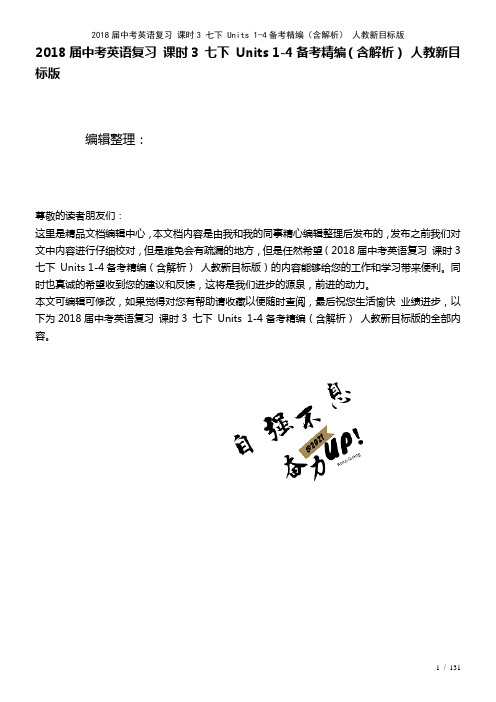
2018届中考英语复习课时3 七下Units 1-4备考精编(含解析)人教新目标版编辑整理:尊敬的读者朋友们:这里是精品文档编辑中心,本文档内容是由我和我的同事精心编辑整理后发布的,发布之前我们对文中内容进行仔细校对,但是难免会有疏漏的地方,但是任然希望(2018届中考英语复习课时3 七下Units 1-4备考精编(含解析)人教新目标版)的内容能够给您的工作和学习带来便利。
同时也真诚的希望收到您的建议和反馈,这将是我们进步的源泉,前进的动力。
本文可编辑可修改,如果觉得对您有帮助请收藏以便随时查阅,最后祝您生活愉快业绩进步,以下为2018届中考英语复习课时3 七下Units 1-4备考精编(含解析)人教新目标版的全部内容。
课时3 七年级(下)Units 1-4Ⅰ.语法与情景对话1.[2017上海]—Do you know a 5—day trip to Hong Kong costs?—I guess it’s about ¥4,000。
A. how fastB. how longC. how soonD. how much2。
[2017西宁]—Excuse me, can you tell me where the nearest bank is, please?— Oh yes! It’s past the office, next to a big market.A. You're welcome。
B. Oh, I beg your pardon?C。
Umm。
, let me think。
D。
What do you mean?3.[2017西宁]Shanghai Disneyland opened June 16, 2016.We want to visit it。
A。
in B. on C. at D. of4。
[2017福州改编]—Mom, may I go swimming now?—Yes, dear, but remember that you go with your dad。
人教版初中英语中考复习知识点归纳总结全册
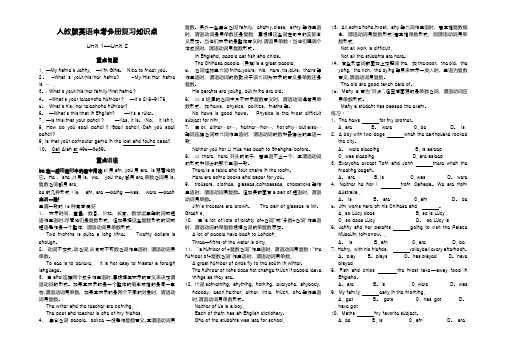
人教版英语中考分册复习知识点Unit 1—Unit 2重点句型1. —My name’s Jenny. —I’m Gina。
Nice to meet you。
2。
-What’s your/his/her name? -My/His/Her name is … .3。
What’s your/his/her family/first name?4。
-What’s your telephone number?—It’s 218-9176. 5。
What’s his/ her telephone number?6。
—What’s this/that in English? —It's a ruler。
7. —Is this/that your pencil?—Yes, it is。
/No,it isn’t.8. How do you spell pencil?/Spell pencil./Can you spell pencil?9. Is that your computer game in the lost and found case? 10。
Call Alan at 495—3539。
重点语法be在一般现在时中的基本用法:I用am, you用are,is跟着他她它。
He ,she ,it用is,we,you they都用are.单数名词用is,复数名词都用are.be的几种形式:is,am, are —being —was,were —been 主谓一致:主谓一致的15种常考情况:1.表示时间,重量,数目,价格,长度,数学运算等的词或短语作主语时,尽管他们是复数形式,但如果把这些复数形式的词或短语看作是一个整体,谓语动词用单数形式.Two months is quite a long time。
Twenty dollars is enough。
2.动词不定式,动名词,从句或不可数名词作主语时,谓语动词用单数。
+Unit3+知识清单+2024-2025学年人教版九年级英语全册
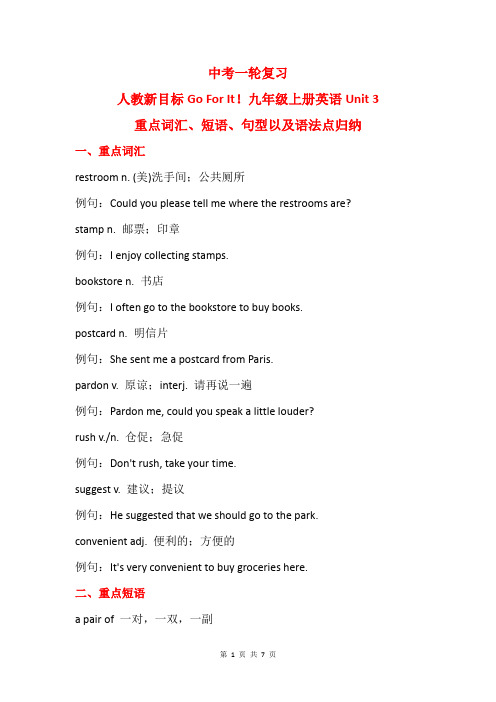
中考一轮复习人教新目标Go For It!九年级上册英语Unit 3重点词汇、短语、句型以及语法点归纳一、重点词汇restroom n. (美)洗手间;公共厕所例句:Could you please tell me where the restrooms are? stamp n. 邮票;印章例句:I enjoy collecting stamps.bookstore n. 书店例句:I often go to the bookstore to buy books.postcard n. 明信片例句:She sent me a postcard from Paris.pardon v. 原谅;interj. 请再说一遍例句:Pardon me, could you speak a little louder?rush v./n. 仓促;急促例句:Don't rush, take your time.suggest v. 建议;提议例句:He suggested that we should go to the park. convenient adj. 便利的;方便的例句:It's very convenient to buy groceries here.二、重点短语a pair of 一对,一双,一副例句:I bought a pair of shoes yesterday.between A and B 在a和b之间例句:The park is between the library and the museum.on one's way to 在去……的路上例句:I saw her on my way to school.get some information about 获取有关……的一些信息例句:I need to get some information about the train schedule. turn left/right 向左/向右转例句:Turn left at the second crossing.a good place to eat 一个吃饭的好地方例句:This restaurant is a good place to eat seafood.deal with 对付;应付例句:I don't know how to deal with this problem.hang out 闲逛例句:I like to hang out with my friends on weekends.三、重点句型1.问路常用的句子Do you know where the school is?Can you tell me how I can get to the library?Could you please tell me how to get to the post office?2.日常交际用语Excuse me, where is the nearest restroom?Turn left at the next corner and go straight.I'm sorry, I don't know.3.表达意愿或建议I'd like to go to the movies tonight.Why don't we take a walk after dinner?He suggested that we start early tomorrow morning.4.使用宾语从句I don't know if he will come to the party.She asked me where I had been all day.He believes that practice makes perfect.四、语法点1.宾语从句宾语从句在复合句中作主句的宾语,通常由连接词(如that, if, whether, what, when, where等)引导。
2023年人教版中考英语专项复习-代词 课件

• other另外的作定语,常与复数名词连用,但如果前面有 theno,my,your,his 等,则可与单数名词连用
• the other两者中的另一个常与one连用,构成“one...the other...";作定语修饰复数名词时,表示“其余的 全部”
• others另一些泛指别的人或物(但不是全部);不能作定语;可以构成“some...others...”结构
• 例如:----Hello. This is Mary. Who’s that? • 喂,我是玛丽。你是谁? • ----This is Tom. 我是汤姆。
•Who •Whom •What •Which
不定代词
• 1.some /anyany • 既可以指代或修饰可数名词,也可以指代或修饰不可数名词 • 2.some一般用于肯定句中 • 在疑问句中,当表示说话人希望得到肯定回答或表达请求、建议
• My aunt can speak a little English and she learned it all by -h--e--r-s-e--l-f--.我姑姑会说一点英 语。她完全是自学的
• (2)反身代词在句中作表语
• Iam not quite--m---y-s-e--l-f--- today.今天我身体不舒服。
二、it 的用法
• 4.指代时间或季节 • -What's the time now? 现在几点了? • -It's ten oclock.十点了。 • 5.指代天气 • 一What's the weather like today? 今天天怎么样? • -It‘s sunny今天是晴天 • 6.指代距离 • How far is it from your school to yourhome? • 从学校到你家有多远?
【人教版】中考英语总复习八年级下册Unit3-4
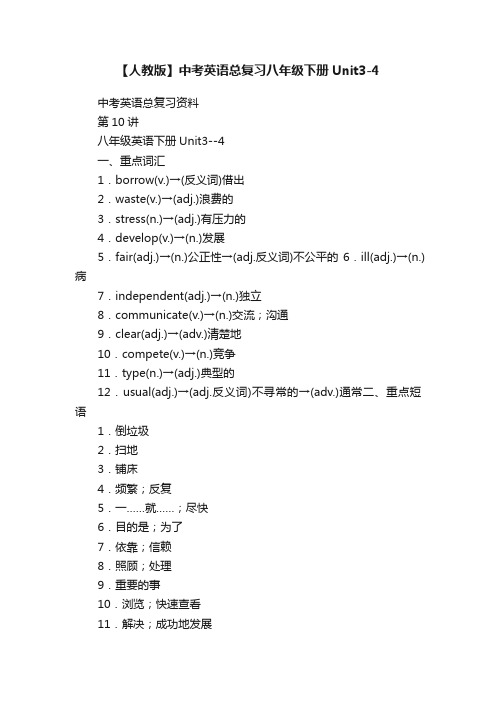
【人教版】中考英语总复习八年级下册Unit3-4中考英语总复习资料第10讲八年级英语下册Unit3--4一、重点词汇1.borrow(v.)→(反义词)借出2.waste(v.)→(adj.)浪费的3.stress(n.)→(adj.)有压力的4.develop(v.)→(n.)发展5.fair(adj.)→(n.)公正性→(adj.反义词)不公平的6.ill(adj.)→(n.)病7.independent(adj.)→(n.)独立8.communicate(v.)→(n.)交流;沟通9.clear(adj.)→(adv.)清楚地10.compete(v.)→(n.)竞争11.type(n.)→(adj.)典型的12.usual(adj.)→(adj.反义词)不寻常的→(adv.)通常二、重点短语1.倒垃圾2.扫地3.铺床4.频繁;反复5.一……就……;尽快6.目的是;为了7.依靠;信赖8.照顾;处理9.重要的事10.浏览;快速查看11.解决;成功地发展12.和睦相处;关系良好14.把某物归还给某人15.主动做某事16.与……交流17.与某人竞争18.删除;删去19.直到……才……20.比较;对比21.依……看22.和某人打架三、重点句型1.我至少看完这个节目行吗?Could I finish this show?2.如果她看到这样不整洁,她会不高兴的。
She happy if she sees this mess.3.她没有做家务活,我也没有做。
She didn't do any housework and I.4.我能用一下你的电脑吗?对不起,我现在要用它工作。
—Could I use your computer?—Sorry.I'm going to it now.5.我一在电视机前坐下,我妈妈就过来了。
My mom came over I sat down in front of the TV. 6.如今的孩子们依赖父母亲太多。
最新人教新目标中考英语分册复习:九年级全一册Units3-4 精品课件
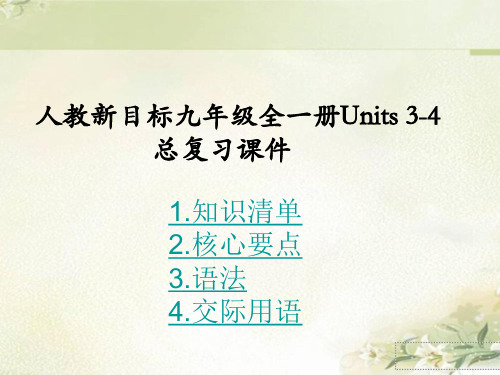
(2)direct的派生词: directly adv. 直接地;径直地 director n. 经理;导演 direction n. 指示;指导(不可数)
用法说明;操作指南(可数) 方向;方位(可数) 用direct的适当形式填空。
(1)He answered me very _d_i_r_e_ct_l_y_. (2)I gave him full _d_i_re_c_t_io__n_s_ to help him
人教新目标九年级全一册Units 3-4 总复习课件
1.知识清单 2.核心要点 3.语法 4.交际用语
(一)单词 1. _b_e_si_d_e____ prep. 在……旁边 2. _p_a_r_d_o_n_ v. 原谅 3. _r_u_sh______ v. & n. 仓促;急促 4. suggest→(名词)_s_u_g_ge_s_t_io_n_ 5. centre→(形容词)__c_e_n_t_r_al__
6. _fa_s_c_i_n_a_ti_n_g_ adj. 迷人的;机具吸引力的 7. crowded → (反义词) _u_n_c_r_o_w_d_e_d__ 8. _c_o_n_v_e_n_i_e_n_t_ adj. 方便的;便利的 9. polite→ (副词) p__o_li_te_l_y__→ (反义词)
8. silent adj. 不说话的;沉默的 [拓展] silently adv. 沉默地 silence n. 沉默 in silence 沉默地 根据句意及汉语提示完成句子。
(1) The teacher seemed angry. He wanted us to keep _s_il_e_n_t__ (沉默的), but we didn’t stop talking.
- 1、下载文档前请自行甄别文档内容的完整性,平台不提供额外的编辑、内容补充、找答案等附加服务。
- 2、"仅部分预览"的文档,不可在线预览部分如存在完整性等问题,可反馈申请退款(可完整预览的文档不适用该条件!)。
- 3、如文档侵犯您的权益,请联系客服反馈,我们会尽快为您处理(人工客服工作时间:9:00-18:30)。
中考基础知识(JUNIOR BOOK III UNIT 15-18)加入日期:2004-4-5 点击次数: 30一.知识网络【重点内容概要】1.过去完成时2.购物用语及书信格式3.能运用so…that和so that引导的状语从句4.动词不定式作主语5.定语从句【句型、词组精讲】seemseem意为“似乎”、“好象”,为不及物动词,常用于以下几种结构:1.后面可接不定式的一般式(seem to do sth.),不定式的进行式(seem to be doing sth.)和不定式的完成式(seem to have done sth.)。
如:She seems to be right. 看来她好像是对的。
Jack seems to be doing his homework. 杰克好像正在做家庭作业。
2.可接从句,构成句型“It seems/ seemed that…”意为“看起来好像……”。
如:It seems that he is right. 看来他好像是对的。
It seems that he has read the book. 看来他好像已读过这本书。
3.后接形容词作表语。
如:The teacher seems angry. 老师看起来很生气。
This book seems quite interesting. 这本书看起来很有趣。
4.后接名词、动词ing形式或介词短语。
如:She seems a clever girl. 她看上去是个聪明的女孩。
It seems raining. 天好像要下雨。
He seems at home. 他好像在家里。
5.还可用于there be 句型中,表示“似乎有……”。
如:There seems to be nobody in the classroom. 教室里似乎没有人。
“是否”if & whether1.if 和whether 在其引导的宾语从句中作“是否”解时,一般情况下,两者可通用。
但if常用于口语中,whether比较正式。
2.if 和whether在下列情况下不能通用。
(1)作介词宾语时用whether,而不用if。
如:I’m interested in whether he’ll go out.(2)whether引导的宾语从句可移到主句之前,if则不能。
如:Whether th is is true or not, I’m not sure.(3)与动词不定式连用时,只能用whether。
如:She can’t decide whether to go to Japan.(4)宾语从句的谓语动词是否定形式时,只能用if。
如:I want to know if he won’t come here tomorrow.表示“也”种种初中英语教材中出现了六个意思相当于汉语“也”的单词,用法比较广泛,现分述如下:1. too用在肯定句中,放在句末,前面可用逗号与句子隔开,也可不用;也可放在句子中间,前后都加逗号。
如:(1)Nice to meet you, too. 见到你我也很高兴。
(2)You, too, may have a try. 你也可以试一试。
2. either用在否定句中,常放在句末,前面常用逗号与句子隔开。
如:He can’t sing. I can’t sing, either. 他不会唱歌,我也不会。
3. also放在句子中间,不用逗号隔开。
如:She also likes English. 她也喜欢英语。
4. so用在肯定句中,常用句式为:so+助动词、系动词或情态动词+主语,表示前面说的情况也适用于后者。
如:(1)A:Tom likes dancing. 汤姆喜欢跳舞。
B:So do I. 我也喜欢。
(2)Li Lei went to the park yesterday and so did I. 李雷昨天去公园了,我也去了。
(3)I am a teacher and so is she. 我是位教师,她也是。
5. neither用在否定句中,常用句式为neither+助动词、情态动词或系动词+主语,表示前面说的情况也适用于后者。
如:(1)My brother doesn’t like playing football and neither do I. 我弟弟不喜欢踢足球,我也不喜欢。
(2)A: Han Meimei can’t draw. 韩梅梅不会画画。
B: Neither can I. 我也不会。
(3)She isn’t right and neither am I. 她不对,我也不对。
6. nor用法如同neither。
区别为neither用于两者之间;nor用于两者或两者以上。
如:(1)Wei Fang has no story-books. Neither (Nor) do I. 魏芳没有故事书。
我也没有。
(2)Wei Fang has no story-books. Nor do I. Nor do you. 魏芳没有故事书。
我也没有。
你也没有。
7. 以上有些句式可以相互转换。
如:(1)He can’t sing. I can’t sing, either.He can’t sing. Neither/ Nor can I.(2)My sister likes singing and so do I.My sister likes singing and I like it, too.(3)She also goes to work by bike.She goes to work by bike, too.【语法精讲】被动语态主动语态变被动语态必须注意下面几个问题。
谓语动词的人称和数应和主动结构的宾语保持一致。
如:They built the tall building last month. →The tall building was built last month. 与原句时态应保持一致。
如:They will speak English. →English will be spoken.动作的执行者无须说明或不必强调时,by短语可省略。
(如没握最好不要省。
)如:We speak English in our school. → English is sp oken (by us) in our school.主动结构中作宾补的不定式可以省去to,但变为被动语态时必须加上to .如:He made me finish the work at once. → I was made to finish the work at once.被动句中by短语和with等短语用法不同:强调动作的执行者要用by;表示状态或主动者所用的工具或手段要用with。
如:The work was done by him.The mountain was covered with snow.当主动语态含有双宾语时可将任何一个宾语变为被动语态的主语,另一个不变,但当直接宾语作主语时,要在间接宾语前加上介词to或for。
如:My sister gave me a pen yesterday. → A pen was given to me by my sister yesterday. / I was given a pen (by my sister) yesterday.“主语+谓语+宾语+宾补”句型变为被动语态时,只能将主动结构中的宾语变为被动结构中的主语,而宾补不变。
如:I heard her sing a song in the next room. → She was heard to sing a song in the next room.I saw him getting on a bus. → He was seen getting on a bus.当主动语态的动词是短语动词时,变为被动语态时不能将动词后的介词或副词丢掉。
如:He sent for the doctor at once. → The doctor was s ent for at once.当主动语态的谓语或宾语部分含有不定式时,变为被动句时要将不定式变为被动结构。
如:He is going to do his homework. → His homework is going to be done.下面几种情况主动语态不能改为被动语态。
(1)当宾语是myself等反身代词时;(2)当谓语是表示状态的动词如:have, own, hold等时;(3)当宾语是动词的ing形式时;(4)当宾语是相互代词时;(5)当宾语是表示数量,重量、大小或程度等时。
动词不定式1.动词不定式作定语时,不定式所表示的动作与其所修饰的中心词之间一般有三种关系:(1)动宾关系:即动词不定式所表示的动作与其所修饰的中心词之间具有逻辑上的动宾关系。
如:She has a lot of work to do. 句中不定式to do与work构成动宾关系。
说明:当作定语的不定式为不及物动词时或不定式虽是及物动词,但不能与中心词构成合理搭配时,不定式后要加适当的介词。
如:We have nothing to worry about.They are looking for a house to eat in.(2)主谓关系:中心词与不定式所表示的动作之间具有逻辑上的主谓关系,即中心词是不定式动作的发出者。
如:She is always the first to come to school. 句中的the first 是come to school的逻辑主语,即这个动作的发出者。
(3)同位关系:作定语的不定式是对中心词内容的解释和说明。
如:This is the best way to work out the problem. 句中的way的内容是to work out the problem.2.“疑问词+不定式”结构,在句中可作主语、宾语、表语等。
如:He didn’t know how to do it.The question is when to start.说明:(1) 当句子谓语动词是know, learn, remember, forget, tell等时,其后的宾语从句可简化成“疑问词+不定式”结构,但主句与从句的主语必须一致。
如:I don’t know what I shall do next. →I don’t know what to do next.(2) 当句子的谓语动词是tell,ask, show, teach等,其后带双宾语,且从句主语和间接宾语一致时,宾语从句可转换成“疑问句+不定式”结构。
